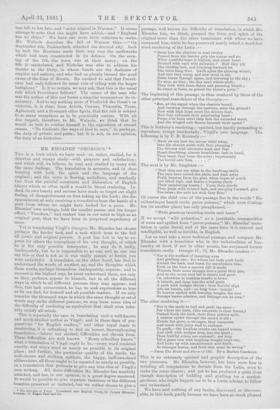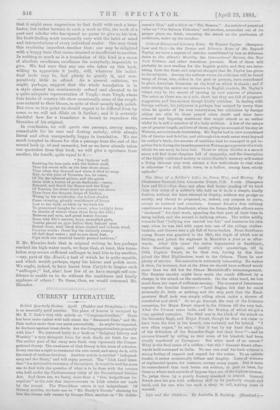MR. RHOADES' "GEORGICS."
Tnis is a book which we have read—or, rather, studied, for it 'deserves and repays study—with pleasure and satisfaction ; and which will, we believe, be read and studied by many with the same feelings. The translation is accurate, and in close keeping with both the spirit and the language of the 'original; and the verse is flowing, melodious, and, markedly free from the painful constraint and dislocation of English idioms which so often spoil a would-be literal rendering. In- 'deed, its own beauty and success have made us forget our slight
feeling of disappointment on first taking up the book ; the dis- appointment at only receiving a trans/aiianfrom the hands of a poet from whom we might have looked for a poem. Mr. Rhoades 4 own writings, both the smaller poems and his longer -effort, " Timoleon," had ranked him in our mind so high as an original poet, that we have been in perpetual expectancy of more.
Yet in translating Virgil's Georgics, Mr. Rhoades has chosen °perhaps the harder task, and a task which tests to the full all poetic and original powers. A poet has but to try to ex- press for others the conceptions of his own thought, of which 'he is the only possible interpreter ; he may do it badly, inadequately, but he is responsible to no one, and no one can say this or that is not as it was really meant, or herein you were unfaithful. A translator, on the other hand, has first to understand the words of another, ay, and the thoughts which those words, perhaps themselves inadequately, express ; and to succeed in the highest way, he must understand them, not only as they, perhaps, appear to himself, but in all the different ways in which to all different persons they may appear; and then, this task surmounted, he has to seek expressions as true as he can find, for himself and all possible readers. If we only consider the thousand ways in which the same thought or set of words may strike different persons, we may form some idea of the difficulty of rendering an equivalent that shall oven toler- ably satisfy all minds.
This is especially the case in translating such a well-known
and much-studied author as Virgil ; and in these days of pre- parations "for English readers," and other royal roads to smattering, it is refreshing to find an honest, thorough-going translation,—labour not shirked, difficulties not shrunk from. These difficulties are well known. "Every schoolboy knows" what a translation of Virgil ought to be,—every word rendered exactly, and every word as nearly as possible in its original place ; and further, the particular quality of the words, the well-chosen and striking epithets, the happy, half-unnoticed alliterations, all those ought to be repeated as nearly as possible, in a translation that pretends to give any true idea of Virgil's own writing. All these difficulties Mr. Rhoades has manfully attacked, and has, in our opinion, in a great degree mastered.
It would be possible to give separate instances of the different beauties preserved or imitated, but we rather choose to give a
The Georgics of V iroil. Translated Into English Verde, by James Rhoades. London 0. Kogan Paul and 0e.
passage, well known for difficulty of translation, in which Mr. Rhoades has, we think, grasped. the force and spirit of the original more than the other translators with whom we have compared him, while he has preserved nearly intact a word-for- word rendering of the Latin :—
" Seest how the chariots in mad rivalry
Poured from the barrier grip the course and go, When youthful hope is highest, and every heart Drained with each wild pulsation ? How they ply The circling lash, and reaching forward let The reins hang free. Swift spins the glowing wheel ; And now they stoop, and now erect in air, Seem borne through space, and towering to the sky ; No stop, no stay; the dun sand whirls aloft ; They reek with foam-flakes and pursuing breath ; So sweet is fame, so prized the victor's palm."
The beginning of this passage is thus rendered by three of the other principalAranslators of the Georgics :— " See, at the signal when the chariots bound,
And bursting through the barriers, seize the ground ! Now with high hope erect the drivers dart, Now fear exhausts their palpitating heart ; Prone o'er loose reins they lash the extended stood, And the winged axle flames beneath their speed."
This is Sotheby's rendering,—spirited, but hardly pretending to reproduce, except incidentally, Virgil's own language.' The following is by C. R. Kennedy :—
"Mark ye not how the racers whirl away, Into the chariot strife with fury plunging ? The drivers with alternate hope and fear Heart-throbbing, almost breathless; lash in hand, They bend, they loose the reins ; impetuously The fervid axle flies 11
The next is by Mr. Singleton :—
" Dost thou not see when in tho headlong strife
The cars have seized the plain, and dash away Forth bursten from the goal, when hopes of youth Are lifted high, and drains a boating throb Their palpitating hearts ? Upon their steeds They press with twisted lash, and stooping forward, give The reins; the axle hot with fury flies."
Of course the chief crux of the passage lies in the words " Ex- sultantiaque haunt corda pavor pulsans," which even Coning- ton (in another place) has only paraphrased,— " While generous trembling thrills each heart."
If we accept "wild pulsation," as a justifiable transposition of noun and epithet from "paver pulsans," Mr. Rhoades' trans- lation is quite literal, and at the same time it is natural and intelligible, as well as forcible, in English.
Let us next take a more technical passage, and compare Mr. Rhoades with a translator who, in the technicalities of hus- bandry at least, if not in other points, has surpassed former translators easily. Georgic IL, 72, Mr. Rhoades renders :—
"Nor is the method of inserting eyes
And grafting ono; for where the buds push forth Amidst the bark, and burst the membranes thiu, Even on the knot a narrow rift is made, Wherein from some strange tree a germ they pen, And to the moist rind bid it cleave and grow. Or, otherwise in knotless trunks is hewn
A breach, and deep into the solid grain A path with wedges cloven ; then fruitful slips Are set herein, and—no long time—behold ! To heaven upshot with teeming boughs, the tree Strange leaves admires, and fruitage not its own."
The other rendering is :-
"Nor is the mode to bud and graft the same—
For where the buds, (like emeralds in their frame,) Pushed forth the bark, their filmy jerkins split,
A narrow eyelet through the crown is slit ; Herein the germ, a stranger, they compress,
And teach with juicy rind to coalesce.
To graft,—the knotleas trunks are lopped amain, And cleft with wedges deep into the grain ; Then fruitful scions are enclosed; nor long Till a groat tree with laughing boughs leaps out, And looks up with astonishment and doubt, At stranger leaves, and fruit that must be wrong."
—From The Fruit awl Kern; of Old. By a Market Gardener.
This is an extremely spirited and graphic description of the two processes. Mr. Rhoades, however, has been more firm in resisting all temptations to deviate from the Latin, even to make the sense clearer ; and yet he has produced a quite close enough description of budding and grafting for a market-
gardener, who might happen not to be a Latin scholar, to follow and understand.
We have said nothing of any faults, discovered or discover- able, in this book, partly because we have been so much pleased that it might seem ungracious to find fault with such a bene- factor, but rather because in such a work as this, the work of a poet and scholar who has spared no pains to give us his best, the fault-finding must necessarily vary with the habit of mind and interpretations of every individual reader. One may think this rendering imperfect, another that; one may be delighled with a happy turn that seems strained or insufficient to another. In nothing so much as in a translation of this kind is a canon of absolute excellence, excellence for everybody, impossible to give. We feel sure that any one who takes up this book, willing to appreciate it justly, will, whatever his indivi- dual taste may be, find plenty to gratify it, and com- paratively little to offend. As a general criticism, we
might, perhaps, suggest that the whole translation is in a style almost too continuously refined and elevated to be a quite adequate representation of Virgil,—even.Virgil, whose four books of country life show occasionally some of the rough- ness natural to their theme, in spite of their usually high polish. But even on this point we should expect to be differed from by some, so we will not dilate ou it further ; and it is certainly doubtful how far a translator is bound to reproduce the blemishes of his original.
In conclusion, we will quote one passage, among many, remarkable for its ease and flowing melody, while always literal and often unexpectedly happy in translation. We are much tempted to choose for this a passage from the end of tho second book (p. 56 and onwards), but as we have already taken one quotation from that book, we will give a specimen from another, the fourth, quite equal to it :—
" But Orpheus' self,
Soothing his love.pain with the hollow shell, Thee his sweet wife on the lone shore alone, Theo when day dawned and when it died he sang. Nay, to the jaws of Trenarus, too, he came, Of His the infernal palace, and the grove Grim with a horror of great darkness,—came, Entered, and faced the Manes and the King Of Terrors, the stone heart no prayer can tame.
Then from the deepest deeps of Erebus, Wrung by his minstrelsy, the hollow shades Came trooping, ghostly scull:lances of forms Lost to the light, as birds by myriads hie To greenwood boughs for cover, when twilight hour Or storms of winter chase them from the hills ; Matrons and men, and great heroic frames Done with life's service, boys, nnwedded Youths placed on pyre before their fathers' eyes. Round them, with black slime choked and hideous weed, Cocytus winds ; there lies the unlovely swamp Of dull dead water ; and to pen them fast, Styx with her ninefold barrier poured between."
If Mr. Rhoades feels that in original writing he has perhaps reached his high-water mark, we hope that, at least, this trans- lation may secure sufficient suffrages to lead him to try another, —say, part of the ifineid, a task of which he is quite capable, and which would, perhaps, repay his labour and polish more.
We ought, indeed, to have learnt from Carlyle to despise such "suffrages ;" but, alas! how few of us have enough self-con- fidence to enable us to do without the confidence and kindly applause of others ! To these, then, we would commend Mr. Rhoades.



































 Previous page
Previous page